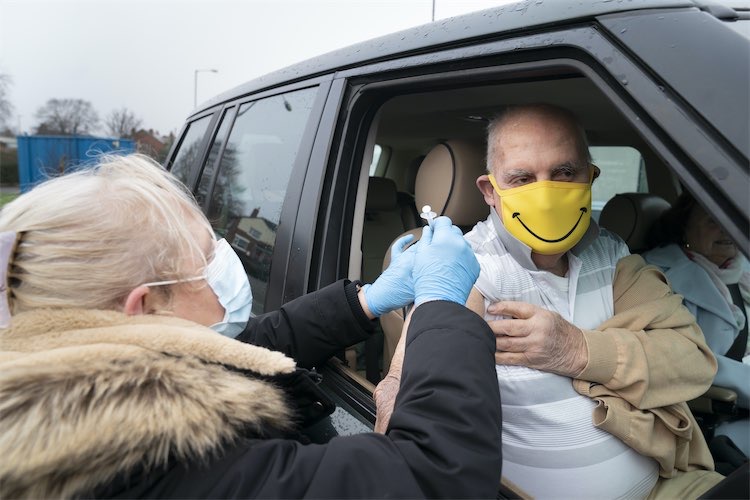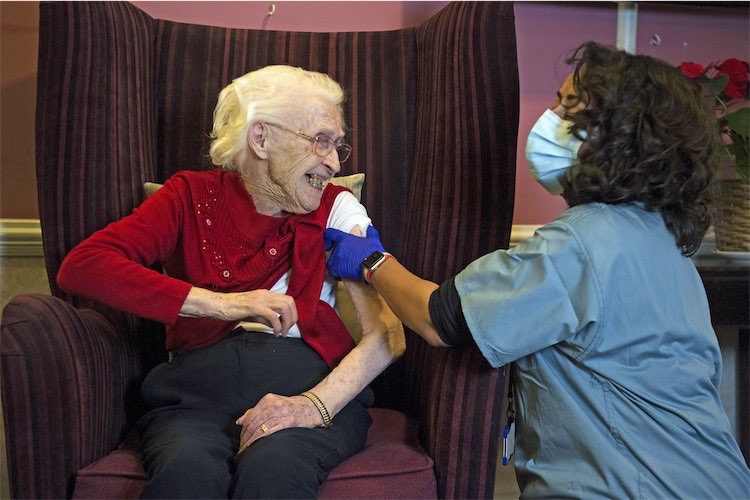Here's Why The UK's Coronavirus Vaccine Rollout Is Already Hitting Delays
7 min read
The UK was the first country in the world to approve a vaccine for the prevention of coronavirus, but despite the head start the scheme has hit several stumbling blocks. PoliticsHome sets out the issues slowing down the rollout of the covid jab.
Prime Minister Boris Johnson has repeatedly pledged a target of two million jabs a week, tying the widespread rollout to the scaling-back of lockdown restrictions. The UK, so far, has delivered just one and a half million doses, calling into question whether the vaccine will have been delivered in a sufficient enough quantity for life to return to normal by the Summer.
Despite the continued insistence of ministers that the roll-out was proceeding at pace, there have been several bottlenecks that may have prevented the deployment of the vaccine.
Currently, the UK's drug watchdog, the MHRA, have approved two vaccines for use; the Pzifer/BioNTech jab and the Oxford/AstraZeneca vaccine.
The Government has secured orders of around 40 million doses of the Pzifer vaccine and a further 100 million from Oxford/AstraZeneca, enough to vaccinate the entire population.
But despite the massive orders, several GP surgeries have reported delays to the deliveries, with some patients who had been booked in for appointments having their slots cancelled at the last minute.
While many GPs have begun the latest round of vaccinations today, others have been forced to push back their vaccination schedule, blaming "logistical" issues.
In a Facebook post to a local community group, one practice manager in Sussex told patients: "Unfortunately all appointments that had been made for this week for the over 80s Covid vaccinations have had to be cancelled due to a logistical delivery problem that was completely out of our control...
"We do not have any control on the deliveries nor do we control how quickly these vaccines are delivered and in what order they are given."
TESTING AND LOGISTICS

The Oxford/AstraZeneca jab is easy to store and transport because it can be stored at normal fridge temperatures, unlike the Pfizer doses which must be stored at -94°F until they are ready to be injected.
But under the regulatory requirements of the MHRA, each batch of the vaccine must still be tested for quality and safety by the National Institute for Biological Standards and Control (NIBSC).
It means that one sample from each batch of hundreds of thousands of doses must go through a rigorous testing process, which can take up to 20 days, before the vaccines are approved for delivery.
Those checks come on top of the manufacturers' own quality checks which are conducted before the vaccines leave the factory, adding a further layer of complexity to the process.
Meanwhile, the sheer volume of batches arriving in the UK mean that extra pressure is being put on the MHRA, with a spokesperson for the regulator saying they were working closely with the manufacturers to ensure doses are released "as quickly as possible".
They added: "NIBSC has scaled-up its capacity to ensure that multiple batches can be tested simultaneously, and that this can be done as quickly as possible, without compromising quality and safety."
Other factors playing into the delay, according to ministers, is the delays at the manufacturing sites - a claim that has been disputed by both Pzifer and AstraZeneca.
But even once the doses have arrived, DHSC and NHS England have a complicated process for evaluating where batches must go to ensure that groups of surgeries, known as primary care networks (PCN), with the highest number of at-risk patients, receive the doses first.
Ruth Rankine, director of NHS Confederation's PCN Network, said: "We are aware of a number of PCN sites that are having problems with vaccine supplies. [The NHS] is aware and is helping to sort out on a case by case basis.
"Because of the vaccine supply, the distribution is being nationally controlled to ensure most effective use of supplies across all vaccination sites. It is important to ensure that there is equity of access to the vaccine for the priority cohorts so there needs to be a balance of which sites get the vaccine and when to ensure that all priority cohorts are covered."
She added: "Primary care is doing a really fantastic job despite challenging circumstances. With any new programme there will always be teething problems but they have shown tremendous commitment to do what is right for their patients."
FILL AND FINISH

Once the vaccines are manufactured, they must be placed into special vials made from borosilicate glass before they can be transported and delivered to vaccine centers - a process known as fill and finish.
But the global nature of the pandemic has put strain on the process, with drug manufacturers warning last year that manufacturing shortages could delay the roll out.
Speaking to PoliticsHome ahead of the Pfizer roll out, Steve Turner, assistant general secretary of union, Unite, said the UK could face particular problems because it lacked a domestic manufacturing capability.
"The problem we’ve got now is what we’ve always complained about around manufacturing, we’ve allowed manufacturing to simply exodus the UK over decades," he said.
"Our last borosilicate manufacturing plant from glass, which is what vials are made from, it’s a specific type of glass...that withstands extremes of heat and cold and has shock defence mechanisms built into the glass...we don’t manufacture it anymore.
"We closed our last plant in Sunderland in 2007 and allowed that to go offshore. We are now reliant on importing this glass from elsewhere around the world at a point when everybody’s looking for this glass."
England's deputy chief medical officer, Jonathan Van-Tam, has also suggested problems with "fill and finish" materials could delay the process.
"The only thing that is going to slow us down is batches of vaccines becoming available.
"Many of you know already that it is not just about vaccine manufacture. It's about fill and finish, which is a critically short resource across the globe."
A Department for Health and Social Care spokesperson denied there were supply issues, but industry insiders have expressed fears that there could be more acute shortages as other countries begin their vaccine delivery programmes.
VOLUNTEERS

To meet the two-million-a-week target, ministers put out a call for volunteers, including retired health care staff, to help meet the schedule, but that too has faced set backs.
One frequent complaint was the amount of beaucracy involved with registering volunteers, with Conservative MP and former GP Liam Fox telling MPs earlier this week that having signed up for the scheme he was required to "complete courses on conflict resolution, equality, diversity and human rights, moving and handling loads and preventing radicalisation".
While a spokesperson for the Department for Health and Social Care said there had been "no delays" to the programme as a result of accrediting volunteers, Mr Hancock vowed to go through the training programme "line by line", adding that "some of the training that has been put in place I don't think is necessary."
To achieve the government's ambitious vaccine targets, the government is going to have to move faster to overcome these hurdles, and already there are signs that the pledge might not be hit.
Speaking earlier, Mr Hancock said the number was only a "best case scenario", prompting a rebuke from Dr Mike Tildesley, a member of the government's SAGE advisory group, who said: "The government shouldn't have announced it if it was only a best case scenario.
He added: "Now rather than offering carrots to the public, they need to do everything to meet that goal."
A government spokesperson said: "Over 1.3 million people, including almost a quarter of people aged over 80 in England, have been vaccinated and the NHS is doing everything possible to roll out doses as quickly as they can be supplied and quality checked.
"From today the Oxford/AstraZeneca vaccine is being rolled out to GP surgeries and vaccinations will be taking place at over 1,000 sites by the end of this week.
"The NHS will be offering a vaccination to everyone in the top four priority groups as set out by the Joint Committee on Vaccination and Immunisation - a total of 13.9 million people - by 15 February."
